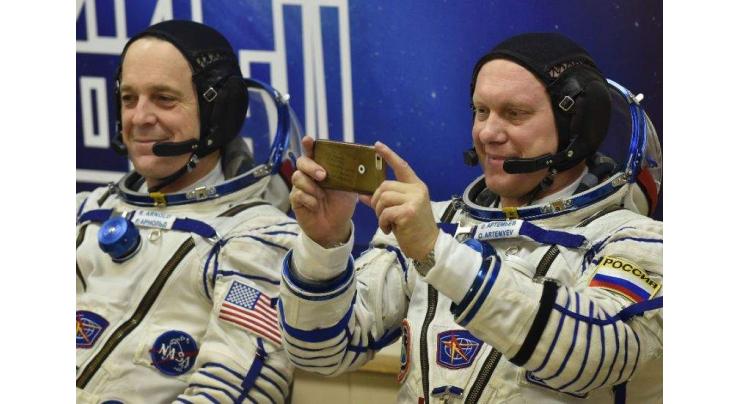
Two Americans, One Russian Blast Off For ISS From Kazakhstan
Rukhshan Mir (@rukhshanmir) Published March 21, 2018 | 11:59 PM

Two astronauts, a cosmonaut and a ball set to be used in the forthcoming football World Cup in Russia blasted off Wednesday for a two-day flight to the International Space Station.
Baikonur, Kazakhstan, (APP - UrduPoint / Pakistan Point News - 21st Mar, 2018 ) :Two astronauts, a cosmonaut and a ball set to be used in the forthcoming football World Cup in Russia blasted off Wednesday for a two-day flight to the International Space Station.
NASA's Drew Feustel and Richard Arnold lifted off from the Baikonur cosmodrome in Kazakhstan for a five month mission in a Soyuz MS-08 under the command of Russian colleague Oleg Artemyev at the expected time of 1744 GMT.
All three crew members have been in space before although NASA duo Feustel, 52, and Arnold, 54, have never served on a long-duration spaceflight and have just 40 days in orbit between them. Artemyev, who is commanding a Soyuz craft for the first time, spent 169 days at the International Space Station during his previous mission in 2014.
In the build up to the launch, Russian media coverage homed in on Artemyev taking to the orbital laboratory a football that is expected to kick off the 2018 World Cup the country is hosting this summer.
"We are taking a ball with us," Artemyev told a pre-flight press conference on Tuesday. "Possibly the one that will be used in the first game," said the 47-year-old, who attended school in the steppe town right next to the cosmodrome in central Kazakhstan.
His colleague from the Russian space agency Anton Shkaplerov is expected to take the ball back down to earth less than two weeks before the national team take on Saudi Arabia in the tournament opener on June 14.
The three men will join Expedition 55 commander Shkaplerov NASA's Scott Tingle and Norishige Kanai of the Japanese space agency at the orbital lab on Friday. The ISS laboratory, a rare example of American and Russian cooperation, has been orbiting Earth at about 28,000 kilometres per hour since 1998.
Related Topics
Recent Stories

Tennis: ATP Barcelona Open results - 1st update

Swiatek's perfect 10 in Stuttgart as Vondrousova stuns Sabalenka

Arandu's roads closed due to flooding

Oil tanker catches fire in Islamabad’s Blue Area

Pakistan committed to ensure safety of foreign nationals: FO

Tennis: WTA Stuttgart results - 1st update

Four passengers injured as train hit an empty vehicle

Over- speeding bus crushed to death two bike riders

Turkey's Freedom Flotilla ready to set sail for Gaza

French teen dies from heart failure after knife attack near school

Iranians appear unfazed by Isfahan blasts

UAF celebrates Int'l Chinese Language Day
More Stories From World
-
Togo lawmakers approve contested political reform
4 hours ago -
NATO must choose 'whether we indeed are allies': Zelensky
4 hours ago -
US House to vote on Ukraine, Israel, Taiwan aid package
4 hours ago -
Calls for calm after reported Israeli strike on Iran
5 hours ago -
IMF calls on EU to deepen single market integration to boost growth
5 hours ago -
Second Ecuadoran mayor killed ahead of anti-crime referendum: police
5 hours ago
-
Oil, gas drilling blocked in Alaska wilds as Biden seeks green cred
5 hours ago -
Man sets self on fire outside Trump trial
5 hours ago -

Turkey's Freedom Flotilla ready to set sail for Gaza
7 hours ago -

French teen dies from heart failure after knife attack near school
7 hours ago -

Iranians appear unfazed by Isfahan blasts
7 hours ago -

Ecuador mayor killed ahead of anti-crime referendum: police
7 hours ago



